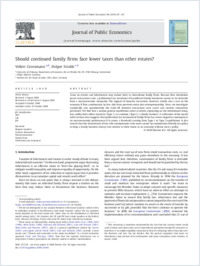Should continued family firms face lower taxes than other estates?
BP2-STS
- Grossmann, Volker ORCID University of Fribourg
- Strulik, Holger ORCID Institute for the Study of Labor (IZA)
- 2010
Published in:
- Journal of Public Economics. - Elsevier BV. - 2010, vol. 94, no. 1-2, p. 87-101
Bequest taxation
Creative destruction
Entrepreneurship
Family firms
Preferential tax treatment
Finance
Economics and Econometrics
English
Taxes on estates and inheritances may induce heirs to discontinue family firms. Because firm dissolution incurs transaction costs, a preferential tax treatment of transferred family businesses seems to be desirable from a macroeconomic viewpoint. The support of dynastic succession, however, entails also a cost on the economy if firm continuation by less able heirs prevents entry into entrepreneurship. Here, we investigate analytically and quantitatively the trade-off between transaction costs saved and creative destruction prevented. We find that a unique general equilibrium exists at which, depending on the institutional setup, low-ability heirs either abandon (Type 1) or continue (Type 2) a family business. A calibration of the model with German data suggests that preferential tax treatment of family firms has severe negative consequences on macroeconomic performance if it causes a threshold crossing from Type 1 to Type 2 equilibrium. It also reveals that the descendants of less able entrepreneurs who were caused by continuation-friendly tax policy to keep a family business always lose relative to their status in an economy without such a policy.
- Faculty
- Faculté des sciences économiques et sociales et du management
- Department
- Département d'économie politique
- Language
-
- English
- Classification
- Economics
- License
- Rights reserved
- Open access status
- green
- Identifiers
-
- DOI 10.1016/j.jpubeco.2009.10.005
- ISSN 0047-2727
- Persistent URL
- https://folia.unifr.ch/unifr/documents/323613
Statistics
Document views: 39
File downloads:
- 1-s2.0-s0047272709001200-main.pdf: 98
